Charity

Much has been written about the ways in which the pandemic is exposing the fragility of our communities and the underlying vulnerabilities that were ignored. Over the years, Father’s Heart has tried to do what it can to knit the fraying margins of the neighborhood back into the whole, by reminding people of their God-given dignity and worth. But they are working against decades-long policies that have kept so many New Yorkers from accessing affordable housing and better paying jobs.

In seeking to better steward their resources, Christians may sometimes wonder how their giving to the poor and marginalized might better reflect God’s ultimate gift and sacrifice. The truth is that giving well and wisely isn’t easy – as givers from Andrew Carnegie to Warren Buffett have observed – and it requires wisdom and its own set of skills.

But help is something Christian, and everyone around him, has trouble giving to those who really need it. The Square is full of characters asking for help from unwilling people, including homeless people, charity workers, and women being attacked. Even Christian, an attractive upper-class white guy, can’t get help when his wallet and phone are stolen on the street.
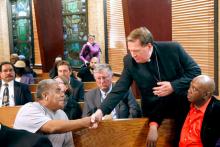
“Now think about it, especially right now, with apparent one-party rule in our government: Congress and the president could pass comprehensive immigration reform tomorrow if they wanted to,” Cardinal Joseph Tobin of Newark told an audience of journalists meeting in Brooklyn on May 17. “They could bring nearly 12 million people out of the shadows — if they wanted to."

First came the showers and the haircuts. Now the washing machines.
In his latest bid to help the poor with practical actions, Pope Francis has opened a free laundromat for the homeless in the heart of Rome.
Since he became pope four years ago, Francis has made it a personal priority to provide them with showers, housing, medical care, and other services to help restore their dignity.

Behind the scenes, for example, the two candidates – who couldn’t bring themselves to shake hands at the third and final presidential debate a night earlier – were brought together by the cardinal during a brief pre-dinner prayer.
“They were both icy from the beginning, you could tell,” Dolan said. “They’re not on each other’s Christmas card list, I can tell you that. You could tell those two had a rather, I’d say, frigid relationship, more than icy.”
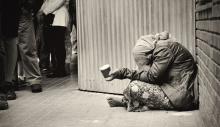
I don’t practice the corporal works of mercy.
The realization left me stunned. As I sat in a cluster of retreatants I thought about what that meant. Sure, I donate money to various charities, participate in food drives, and donate clothes that I no longer need, but I do not practice the corporal works of mercy — I have other people or institutions do it for me.
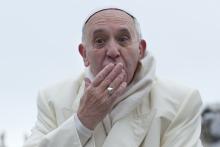
Coming to a theater near you: the Vicar of Christ. The charismatic Bishop of Rome is set to play himself in the movie Beyond the Sun, reports Variety. This will be Pope Francis’ first time acting — not to mention the first time a pope has ever appeared in a feature film.

Pope Francis’ outreach to the homeless with showers, shelters, and other services may have its youngest beneficiary — an infant born on a street near St. Peter’s Square. A homeless woman gave birth on a cardboard box mere yards from the Vatican on Jan. 20 in near-freezing temperatures, according to Reuters.
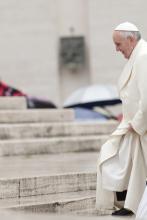
Francis’ visit was said to have delighted around 30 homeless men hosted at the dormitory, who spoke to the pope, recounted their stories and asked to be blessed. The pontiff’s visit lasted around 20 minutes, Vatican Radio reported.
He was accompanied by his almoner (distributor of alms or charity), Archbishop Konrad Krajewski; the Jesuit superior general, the Rev. Adolfo Nicolas; and three nuns who work at the residence.
The “Gift of Mercy” (“Dono di Misericordia”) homeless shelter was inaugurated earlier this month and can host 34 people each night. The building, a former travel agency, was converted by Jesuits as a response to Francis’ call for more to be done to help poor people.
1. Where Pope Francis Learned Humility
Francis’ road to humility was like the rest of ours: long, hard, and prideful.
2. The Meaning of Serena Williams: On Tennis and Black Excellence
“For black people, there is an unspoken script that demands the humble absorption of racist assaults, no matter the scale, because whites need to believe that it’s no big deal. But Serena refuses to keep to that script.”

After winning the Triple Crown, American Pharoah’s jockey, Victor Espinoza, showed that he doesn’t live in fear of losing his power. And, as opposed to the Egyptian Pharaoh, he showed he has a soft heart for those who are suffering.
Espinoza reportedly earned $80,000 for his victory at the Belmont Stakes and he’s giving it all away. “I won the Triple Crown right now,” he stated, “but I don’t make any money because I’m donating all the money to the City of Hope.” The City of Hope is a cancer research and treatment center. Espinoza also donates his time at the City of Hope, visiting with children struck by cancer. He says, “The kids [are] 6 years old, 10 years old, it’s just heartbreaking.” Why does he do it? “I just saw one kid with the disease and that’s how I changed my life. I changed the way I think. Pretty much I changed everything … the first change I made was in my heart.”
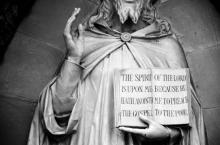
Christian researchers tracking decades of decline in charitable giving say the trend will not be reversed until pastors challenge congregants to embrace Jesus’ teachings on the poor.
But that, says Sylvia Ronsvalle, one of the authors of the annual “Empty Tomb” reports on Christian giving, will take a different kind of pastor than the counselors and comforters that seminaries and divinity schools have trained for ministry.
Seminaries instead need to school future clergy on the affluence of American congregations, and remind church members of “God’s agenda to love a hurting world,” the report said.
“The State of Church Giving through 2012: What are Christian Seminaries and Intellectuals Thinking — or Are They?” was issued by Empty Tomb, an Illinois-based nonprofit that tracks the percentage of church members’ income that they give to their congregation.
“Pastors are not being prepared to effectively pastor their people within an age of affluence,” said Ronsvalle, who wrote the report with her husband, John L. Ronsvalle.


When it comes to donating to charity, Britain’s small but fast-growing Muslim community comes out ahead of other religious groups, a recent survey shows.
Conducted by ICM, a London-based polling agency, the survey shows the U.K.’s estimated 280,000 Muslims report giving more money annually to charity than Christians, Hindus, Sikhs, and Jews.
The survey, conducted on behalf of JustGiving, an online giving platform, also found a 70 percent rise in giving over the past two years from among Muslims to the charity-giving site.
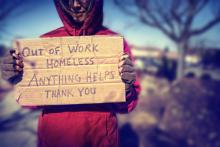
There should be no poor among you - Deuteronomy 15:4
This is one of the few commands virtually all religious people easily – even eagerly – follow.
We just do it our own way.
The biblical and cultural context and overriding assumption is that those of us with means should contribute – willingly and without conditions – to those among us who, for whatever reason, are needy.
We are not to judge – or distance ourselves – from those who have little – or cannot pay us back. In fact these are the ones Jesus commands that we – and by extension he – should invite to a banquet (Luke 14:12-14).
But we seem to have ‘no poor among us’ – we do our best to exclude, ignore, or even ban them when we do see them.
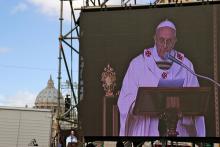
Vatican employees won’t receive the special bonus they are traditionally awarded when a new pope is elected, the Vatican confirmed on Thursday, under orders from Pope Francis to give extra money to charity instead.
“On account of the difficult situation of the general economy, it seemed neither possible nor opportune to burden Vatican institutions with a considerable unforeseen extraordinary expense,” the Vatican’s chief spokesman, the Rev. Federico Lombardi, said in an emailed statement.
In place of the employees’ bonus, Pope Francis ordered Vatican officials to make a donation to some “charitable organizations.”
The money will be drawn from the pontiff’s personal charity budget “as a sign of the church’s attention for the many people who are suffering” from the global economic slowdown, Lombardi said.

As has happened many times after I have given a talk about the Body of Christ’s responsibility to care for their brothers and sisters experiencing impoverished and dehumanizing conditions, I was asked to answerthose questions — the ones in my experience that are always the first to be asked the moment I stop speaking.
“How will I know I have given enough? How does the church balance financial responsibility with service to the poor? Where do we draw the line?”
These questions always come, sometimes spoken in a curious tone by a person whose heart is being convicted, sometimes in an angry accusing tone insinuating I must hate prosperity, sometimes privately as a whisper in my ear or in a personal email filled with insinuations about my sanity. What a preposterous proposal, that the Body of Christ in any particular location should be the first resource to its own community for spiritual, physical, and emotional well being! Don’t I know that such a mission is naïve and impossible to achieve? Most recently it was phrased like this: “I love this idea, but it is difficult to see benevolence funds go towards someone's electric bill when they smell like they smoked five packs of cigs before meeting with us; what do we do?”

Post-recession America is beginning to open its wallet to charities again, but is not giving as generously to religious institutions.
While charitable donations from individuals rose nearly 4 percent overall in 2011, according to the annual "Giving USA" report, donations to houses of worship and other religious bodies dropped by 1.7 percent — a decrease for the second year in a row.
The report, compiled by the Indiana University Center on Philanthropy and released on June 19, shows that individual Americans gave nearly $218 billion last year, $96 billion of which went to religious organizations.
Every year, somewhere between US$200 billion and $1 trillion are spent in “mandatory” alms and voluntary charity across the Muslim world, Islamic financial analysts estimate. At the low end of the estimate, this is 15 times more than global humanitarian aid contributions in 2011.
With aid from traditional Western donors decreasing in the wake of a global recession, and with about a quarter of the Muslim world living on less than $1.25 a day, this represents a huge pool of potential in the world of aid funding.
http://www.irinnews.org/Report/95564/Analysis-A-faith-based-aid-revolution-in-the-Muslim-world